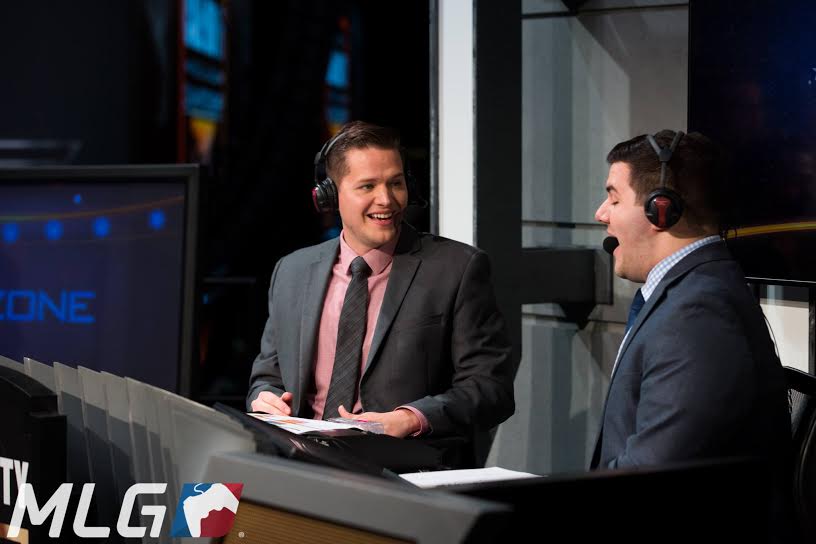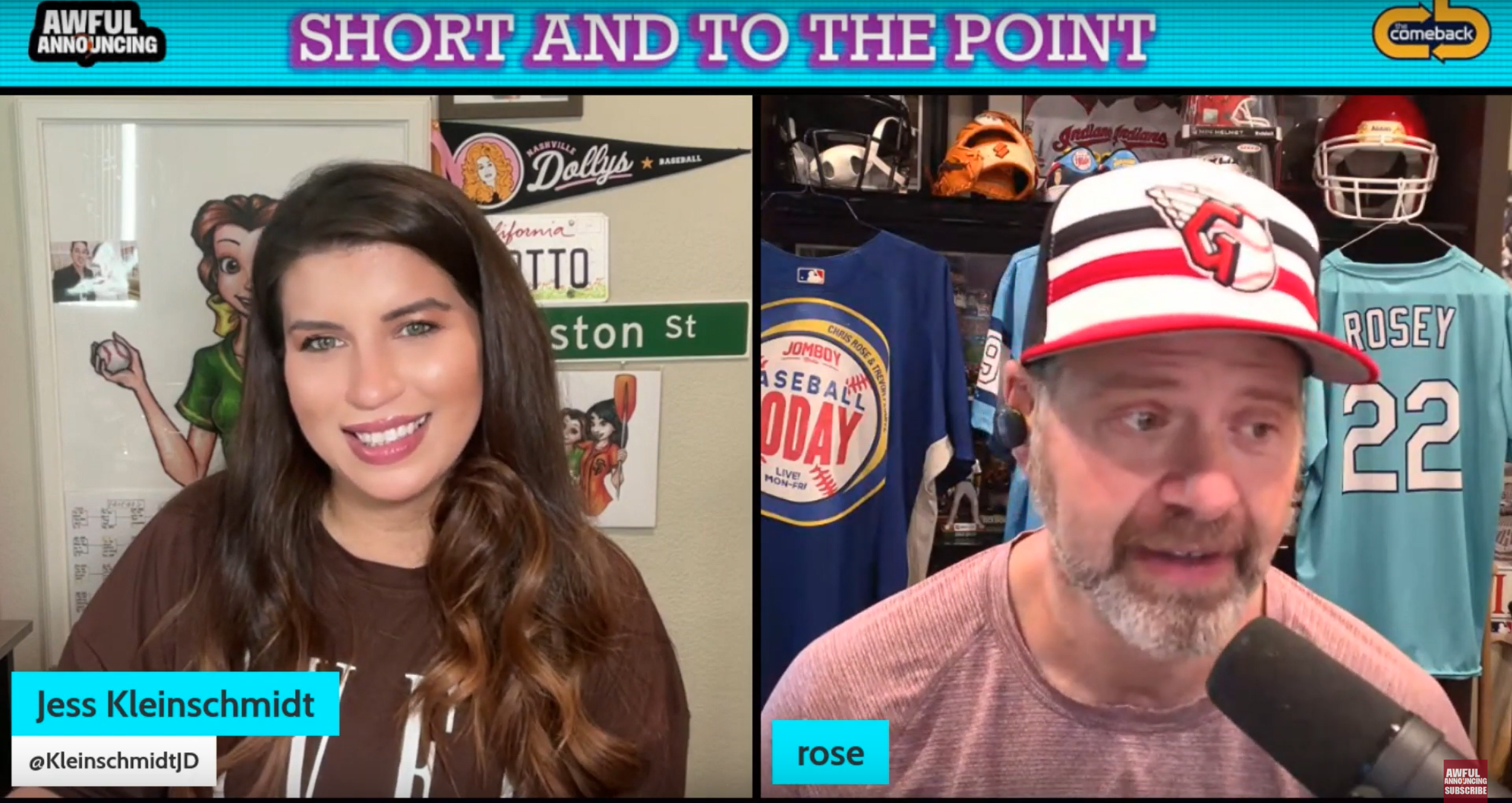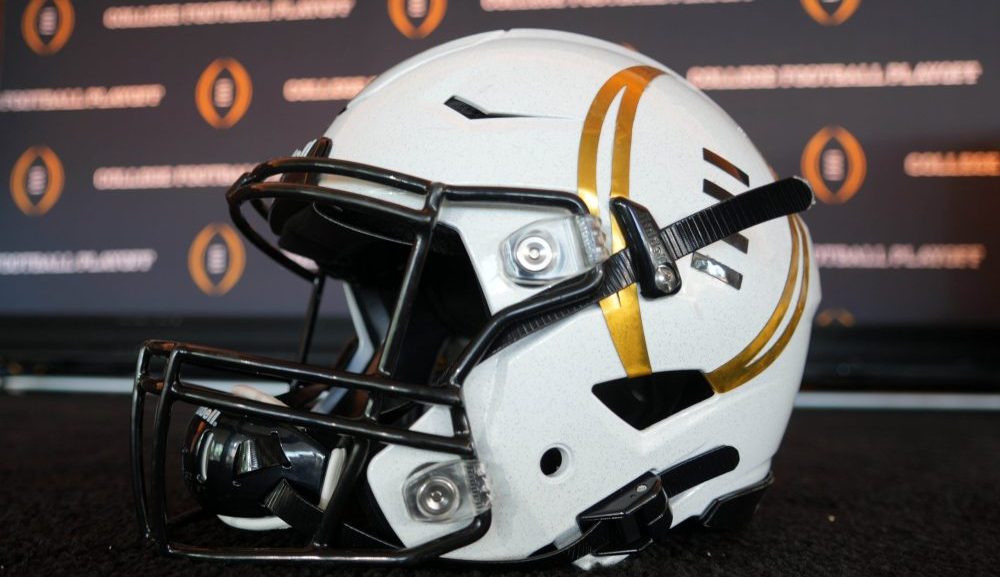The realm of esports broadcasting is often seen as dramatically different from regular sports, but many of those involved think the two have more in common than might be obvious on first glance. The latest there is Major League Gaming TV (MLG.TV)’s Chris Puckett, who spoke to Awful Announcing recently about how he watches tape of football broadcasts for ways to enhance his own on-camera analysis. Puckett said he turned his love of watching football into a way to pick up broadcasting tips, and he appreciates the energy football commentators bring to the sport.
“Football is my favorite sport, that’s the content I’m consuming on a regular basis, but also I really liked the energy of a football broadcast. When I listen into MLB, it’s a much slower pace, a little bit more drawn out. In football, there are those moments where the commentators have to keep up with the pace of the game and go very rapid, but it also has that deep balance of the storytelling in between those plays.”
Puckett grew up in Columbus, Ohio as a big Ohio State Buckeyes fan, and his favorite analyst is ESPN college football analyst Kirk Herbstreit, but for reasons that go beyond just school allegiance.
“It’s the knowledge he brings to the table as a former player, but also, you can tell how much research he puts in,” Puckett said. “Keeping up with college has to be one of the most difficult jobs in all of sports, with the constant rotation of players coming in, not only the team you’re accustomed to broadcasting but also their opponent. I’ve always liked his style; he’s not afraid to smile on camera, he’s a good-looking guy who always has a comment that is additive. Very rarely do you get just kind of a cookie-cutter answer from him that could apply to anyone.”
Puckett said he follows both college and NFL broadcasts regularly, but appreciates some of the extra touches on the NFL.
“I feel like in the college level they do have a number of younger commentators. It seems like to get into the starting lineup at the NFL level, you need to have serious credibility and quite a bit of experience already calling games, so I think that’s a big factor. I prefer to watch the NFL stuff, I just think the broadcasts are a little more polished and have a total package of graphics and video and all that stuff that goes into it. I watch a lot of both, but normally I’m watching the Cowboys on Sunday.”
Puckett said one big difference from football broadcasting to esports broadcasting is how quickly things happen in esports, leaving analysts very little time to make their points.
“For us, it’s so difficult with the pace of our game. As soon as we want to tell you about how that first score went in, there’s a second one on its way. A lot of the time, we have to make a quick comment, and then if we have time at halftime or postgame, we’ll do a deeper dive with the replay, pointing out the game-changing moment. But that’s always our challenge.”
Puckett said that can vary from game to game, but in first-person shooters in particular, analysts need to be particularly on their feet.
“Within every single esports title there’s going to be a different speed of the game, and with every single matchup within those esports titles, there’s going to be a different tempo based on how the teams like to play, whether they’re a slow, passive, methodical, tactical team, or whether they’re a squad that just rushes their opponents to keep the action up. In the first-person shooter realm, what we’re doing is telling a story from the individual’s first-person perspective, and that’s a big part of why we need to constantly update you, because as soon as somebody dies, we need to go over to the next person’s point of view.”
He said even going from one shooter title to another can be a massive change for broadcasters.
“I started out as a broadcaster for Halo in 2001. The Halo franchise kind of consisted of battles that would last between three and eight seconds, so you had some time to develop the commentary as the fights were occurring. Call of Duty, when I made the switch, it was a very difficult learning process. I had to spend about three months just playing the game every day, talking with pro players. The speed with which you can pick up an elimination in that is a second or a fraction of a second. So what I learned in Call of Duty is that I can no longer only focus on what I’m seeing, but also the minimap, which shows us a bigger picture of what is going on all around the level. As soon as my person dies, I know where I want the camera to go next, and I’m able to talk a little bit about the overall strategy and focus in less on the individual kills.”
Puckett’s known for dropping in references to other sports and athletes in those sports, and he said that’s part of an overall goal of making esports relatable for casual fans as well as the hardcore.
“We know our games extremely well. Everyone that plays our games and is watching the broadcast is familiar with that terminology. But if we really want to grow, I think we always need to be appealing to the more casual fan, someone who could be watching for the first time. So we have a game mode called Uplink where there’s a satellite drone and the goal is to take the round drone and throw it into this big glowing sphere, and a lot of times, we’ll be focusing on the guy carrying the drone, but you need to know why he has guys spreading out in front of him. So I tend to refer to those guys as the lead blockers, just as a running back has linemen pulling and clearing the way. We’ll talk about dunks when a player jumps up and scores a two-pointer, because it simply looks like someone going up for a basketball dunk. We use the sports analogies to try and cater to everyone, and hopefully not just the people who play the game will be able to understand what’s happening and appreciate the skill that goes into it. It’s more than just the individual gunfights.”
Puckett’s been into sports for a long time as a player, and has now been involved full-time for over a decade on the production and broadcasting side. After a couple of years of travelling and helping to put on tournaments, he quit school at Ohio University to join MLG.tv full-time in 2006, first on the production side in New York City. He said that was a tough decision, and a leap of faith.
“Absolutely. Back when I started competing, I was afraid to tell the girls at my high school what I did. I kept it under wraps and was doing it on the weekend. In college, it started to gain a little bit more popularity and notoriety, but at the same time, it wasn’t something that everyone was doing. So I knew I was part of a passionate group, I really enjoyed what I was doing, but not many other people at my school were doing it, or knew that this thing existed. But I had the opportunity to travel all over the country, and I saw this was definitely something global. And as we saw more and more tournaments and the online integration came out, over time you could just tell there was potential for this to be everywhere. But no one was doing it.”
He said the jump was well worth it, though.
“I took the gamble for two years to travel and put on up to 13 tournaments a year, and in 2006, the company that I had been doing that for, Major League Gaming, they offered me a position in New York but said they would need me right away. It was basically being offered, ‘Hey, you know this project you’ve been working on for two years? We’re about to take it to the next step.’ And I just couldn’t miss out, regardless of if that was going to take me figuring out how to finance my way through school or come back and finish my degree behind my peers. It was worth that risk.”
The latest
“It’s amazing. I started on the tournament side, just as someone who was trying to figure out how to get a bunch of people excited about something. I was constantly doing some guerrilla marketing online, talking with people on forums. From there, I learned how to be more efficient with operations and how we could grow our tournaments to mass scale, how many teams we could potentially fit in a three-day weekend. And then in 2006, I was really fortunate to move over to the production side. We hired a TV crew, and they did a great job with all the player pieces, and showing what the event looked like, but they had no idea how to display our gameplay. So I was given the challenge, I got to go and actually live in that production studio’s offices for three months and figure out ‘How do we tell the story of all of these players playing at one time? How do we show this so someone who isn’t familiar with the game at all can follow along?’”
He said that work led to his job as a broadcaster.
“I felt like in 2006, we kind of pioneered the way that console esports were going to be shown, how do you display a first-person shooter properly. And in 2006 and 2007, I was writing commentary for actors who would actually do the play-by-play broadcasts. And after that first year writing scripts for Sundance DiGiovanni, my boss, he said, ‘Why don’t you do this with me live?’ So that’s where I went from being a tournament director to working in production studios to now being in front of the camera.”
Puckett said his broadcasting career has changed how he watches sports, and other television programs.
“I’m not able to watch television the same any more. Going through the tournaments and the broadcast side of things, you pick up on graphics that you like, or was that interview segment that you just saw kind of cheated later? Could that have been worked better into the story? I’m learning a lot from different productions, whether it’s reality TV or traditional broadcasts of sports, and I think it’s definitely helped me in my profession as a broadcaster, but also as a producer. I think esports right now, we’re putting out some great products, but it’s only going to get better and better as this industry continues to evolve and as the studios put more tools in the game for our broadcasts.”
Thanks to Chris for his time. You can check out his work on MLG.tv, and follow him on Twitter at @MLGPuckett. Photos here are courtesy of Major League Gaming.









